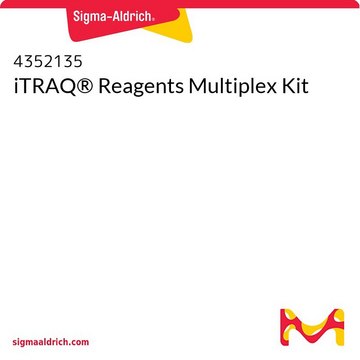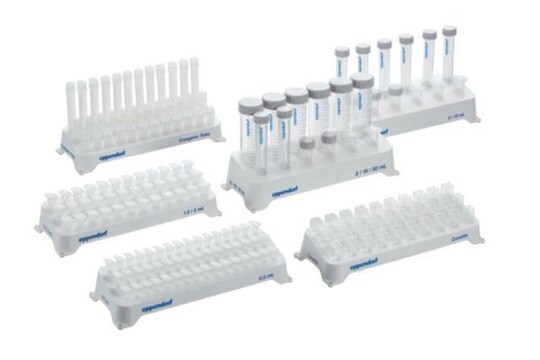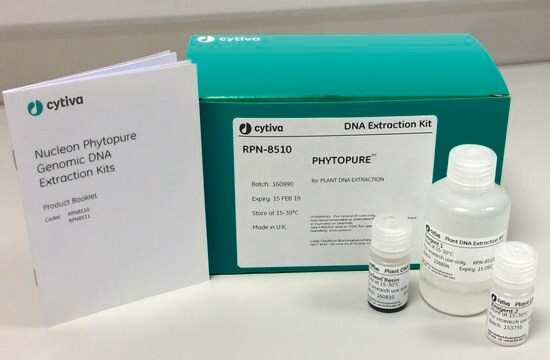Recommended Products
shipped in
dry ice
storage temp.
−20°C
General description
Contains sufficient reaction solutions, test mixture and iTRAQ® Reagents 114, 115, 116 and 117 (for 25 μg protein) to label 10 duplex, 6 three-plex or 5 four-plex experiments.
Application
This iTRAQ application kit for protein provides iTRAQ reagents and protocol to label protein prior to digestion. This iChemistry kit can be used in workflows that include SDS-PAGE separation and in-gel protein digestion, followed by LC/MS/MS analysis. Trypsin is sold separately.
Analysis Note
To view the Protocol for the iTRAQ Reagents 4-plex Application Kit - Protein, please visit this Protocol link.
To view the Chemistry Quick Reference Card for the iTRAQ Reagents, please visit this Chemistry Quick Reference Card link.
To view the Chemistry Quick Reference Card for the iTRAQ Reagents, please visit this Chemistry Quick Reference Card link.
Legal Information
iTraq is a registered trademark of AB Sciex Pte. Ltd.
Signal Word
Danger
Hazard Statements
Precautionary Statements
Hazard Classifications
Eye Irrit. 2 - Flam. Liq. 2 - Skin Irrit. 2
Storage Class Code
3 - Flammable liquids
Flash Point(F)
35.6 °F - closed cup
Flash Point(C)
2.0 °C - closed cup
Choose from one of the most recent versions:
Certificates of Analysis (COA)
Lot/Batch Number
Don't see the Right Version?
If you require a particular version, you can look up a specific certificate by the Lot or Batch number.
Already Own This Product?
Find documentation for the products that you have recently purchased in the Document Library.
Oded Kleifeld et al.
Nature protocols, 6(10), 1578-1611 (2011-10-01)
Analysis of the sequence and nature of protein N termini has many applications. Defining the termini of proteins for proteome annotation in the Human Proteome Project is of increasing importance. Terminomics analysis of protease cleavage sites in degradomics for substrate
Yiping Huang et al.
Cell cycle (Georgetown, Tex.), 11(12), 2367-2379 (2012-06-08)
Cisplatin chemoresistance is a clinical problem that leads to treatment failure in various human epithelial cancers. Members of tumor protein (TP) p53 family play various critical roles in the multiple molecular mechanisms underlying the chemoresistance of tumor cells. However, the
Our team of scientists has experience in all areas of research including Life Science, Material Science, Chemical Synthesis, Chromatography, Analytical and many others.
Contact Technical Service






